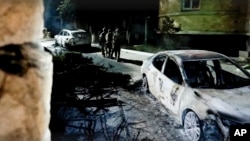While the world has been focused on Russia’s two-year war in Ukraine, Sunday's attacks in Dagestan, a majority-Muslim republic in Russia’s North Caucasus region, were just the latest reminder of Moscow’s long-running conflict with radical Islamists.
Gunmen in Dagestan’s two largest cities — the regional capital, Makhachkala, and Derbent — targeted a police post, two Orthodox churches and a synagogue, killing 21 people, including an Orthodox priest and 16 police officers. Dozens more were injured.
According to Dagestan’s regional head, Sergei Melikov, five attackers were killed.
While there has been no direct claim of responsibility for the attack, the South-Central Asian regional branch of the Islamic State jihadist group welcomed the attack as a response to its call for such strikes.
“Our recent call did not keep us waiting long,” said a statement which appeared on Al-Azaim Media, a Russian-language channel associated with Islamic State in Khorasan Province (also known as IS-K or ISIS-K), as quoted by the Washington Post.
“Our brothers from the Caucasus let us know that they are still strong. They showed what they are capable of,” the statement said.
IS claimed responsibility for an earlier attack in March on the Crocus City Hall concert venue in Moscow that killed 145 people. Unnamed U.S. officials were quoted as saying ISIS-K recruited the four gunmen who conducted the assault, identified as citizens of Tajikistan.
Last October, just weeks after Hamas militants killed 1,200 Israelis in neighborhoods adjoining the Gaza Strip, a mob at Dagestan’s Makhachkala Airport, including people carrying Palestinian flags and shouting “Allahu Akbar,” tried to find people who had arrived on a flight from Israel to prevent them from entering Dagestan.
The airport incident suggested that Islamist radicalism has not dissipated among separatists in the North Caucasus, including those in Chechnya who fought two wars against Moscow in the mid-1990s and 2000s.
Yet Russian President Vladimir Putin blamed the incident on “agents of Western special services” in Ukraine, who he said were “trying to inspire pogroms in Russia” in order to weaken it, The Associated Press reported.
While Putin blamed “radical Islamists” for the Crocus concert hall attack, he also implicated Ukraine and accused the United States of “trying to convince its satellites and other countries of the world that there is supposedly no trace of Kyiv in the Moscow terrorist attack."
Experts interviewed by VOA’s Russian Service said the Kremlin’s focus on prosecuting its war against Ukraine means it has taken its eyes off the terrorist threat.
“From the point of view of the country’s leadership, the main thing is the war in Ukraine. The rest is secondary,” said Alexander Cherkasov, chair of Russian human rights organization Memorial, which was ordered to close by a court in Moscow in December 2021.
Memorial, together with the Center for Civil Liberties in Ukraine, and Ales Bialiatski, director of the Viasna Human Rights Center in Belarus, were awarded the 2022 Nobel Peace Prize.
“The [Russian] security forces who look for ‘saboteurs’ in [Ukraine’s] Kherson region and uncover oppositionists in Russia have no time to deal with real terrorists,” he said.
That view was echoed by Sergei Lukashevsky, a veteran of Russia’s human rights movement who for 14 years headed Moscow’s Sakharov Center, named after Soviet-era dissident and Nobel Peace Prize laureate Andrei Sakharov.
“Naturally, the special services now have a main task related to the interests of the regime in the occupied [Ukrainian] territories. Their attention to everything else is on a residual basis,” said Lukashevsky, who fled with his family to Germany after Russia launched its full-scale invasion of Ukraine in February 2022.
“We see PR work during which the authorities reassure the population. Therefore, all the blame for various terrorist attacks is placed not on international terrorism but on the United States, the West and Ukraine. But this is all pure propaganda. Such measures cannot extinguish the manifestations of radicalism,” Lukashevsky told VOA.
He pointed to another factor that has raised the threat of terrorism inside Russia: a flood of illegal weapons from the war in Ukraine.
“The number of illegal guns has increased noticeably since the start of the war in Ukraine,” Lukashevsky said. “So, there is absolutely nothing surprising in the events in Dagestan. They were quite easily predicted.”
Kremlin spokesman Dmitry Peskov denied that armed Islamist radicalism was on the rise in Dagestan, insisting “the kind of criminal behavior that we saw yesterday in Dagestan is not supported by society, either in Russia or in Dagestan,” the Washington Post reported.
While Putin has not publicly commented on the Dagestan attacks, some officials, including Federation Council head Valentina Matviyenko and Leonid Slutsky, chairman of the foreign affairs committee in parliament’s lower house claimed the attacks were planned from abroad.
Abdulhakim Gadzhiev, a Dagestani member of the State Duma, was more concrete, claiming the attacks were connected to the special services of Ukraine and NATO countries.
However, Dmitry Rogozin, a Federation Council senator who is known for his pro-Kremlin and anti-Western views, warned against falling back on that blame game.
“I believe that if we attribute every terrorist attack involving national and religious intolerance, hatred and Russophobia to the machinations of Ukraine and NATO, then this pink fog will lead us to big problems,” he wrote in post on Telegram. “In someone else's eye we see a speck, but in our own, we cannot see a log. It's about time.”








